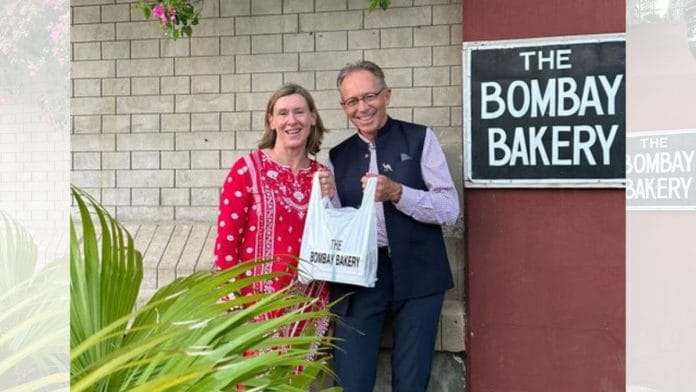New Delhi: When the Australian High Commissioner to Pakistan Neil Hawkins shared a photograph from outside of Pakistan’s legendary Bombay Bakery in Hyderabad — in Pakistan’s Sindh province — it seemed like an ordinary diplomatic post: a foreign envoy enjoying local food. But ‘Pakistan’ and ‘Bombay’ in the same tweet was enough to trigger a wave of nostalgia, stories, and debate about two most enduring culinary landmarks on both sides of the border. The other being the Karachi Bakery in Hyderabad, India.
“Couldn’t leave #Hyderabad without revisiting the iconic #BombayBakery. Their cakes have been loved for generations — the coffee cake seems to be very popular!,” the diplomat wrote on X.
The twin institutions of Bombay Bakery in Hyderabad, Pakistan, and Karachi Bakery in Hyderabad, India, are more than local bakery outlets. They embody tangled histories of memory, migration, and identity in the subcontinent.
For Pakistanis, the bakery is more than a memory of Partition. It is also about culture, history, and heritage. Among the first to respond to the diplomat’s post was Pakistan People’s Party Senator Sherry Rehman, who tied the cake to her childhood in Jamshoro, a university town near Hyderabad.
“It was my favourite place on the weekend in Jamshoro. My father was VC Sindh University and the coffee cake was the Sunday ultimate treat! It has the power of Proust’s madeleine to pull me right back to the warm fragrance of this iconic bakery. Enjoy,” she wrote.
Others quickly added their own memories.
“Bombay bakery is the symbol of love in Hyderabad city, owned by Kumar Thadani, and is run by his adopted son Salman Sheikh. Stay safe ambassador,” Ibn Mushwani added.
Even celebrities had come out in support of Bombay Bakery during the May India-Pakistan conflict when Karachi Bakery in Hyderabad, India, was vandalised. Celebrities such as designer Deepak Perwani and actor Sajal Ali voiced both pride and sorrow over what these bakeries represent.
Perwani’s viral tweet condemned the attack on Karachi Bakery — “We have Bombay Bakery, Bombay Sweets, Bombay Mithai. No one touches their shops. Shameful behaviour”.
On Instagram, Sajal Ali offered a gentler reflection: “In a world full of noise, love and kindness remain the only truth.”
Also read: ‘Get Abhishek Bachchan out early’—Shoaib Akhtar’s advice to Pakistan before Sunday final
A bakery that outlasted Partition
Bombay Bakery itself has lived through the Partition. Founded in 1911 by Pahlajrai Gangaram Thadani, it moved into its current red brick bungalow in 1924. After Partition, while many Sindhi Hindu families migrated to India, the Thadanis stayed.
The recipes — coffee, chocolate, fruit and nuts — remained guarded. Kumar Thadani, son of Pahlajrai Gangaram Thadani, who managed the bakery until his death in 2010, was also known for his philanthropy — funding hospitals and giving alms to the poor. Now, his adopted son Salman Shaikh, who converted to Islam and now lives abroad, is the heir. The daily operations, however, continue much as they did in his grandfather’s day.
That sense of continuity contrasts sharply with the fate of Karachi Bakery in India.
For Pakistanis, it is precisely why a foreign diplomat’s tweet carried such resonance. In the middle of a fraught political climate, it reminded them that food can preserve continuity where borders divide.
For some, Bombay Bakery’s coffee cake is beyond comparison. “Best coffee cake in world,” Pakistani X user Zuma Razi wrote.
Another person, Amir Husain, marveled at its longevity and restraint: “Hyderabad, Pakistan’s Bombay Bakery has been an institution for more than a hundred years…Their production is artisanal and meticulous and their recipe hasn’t changed an iota for over a century! And during this entire time… they have sold out their entire production every single day. For more than 100 years.”
(Edited by Aamaan Alam Khan)






